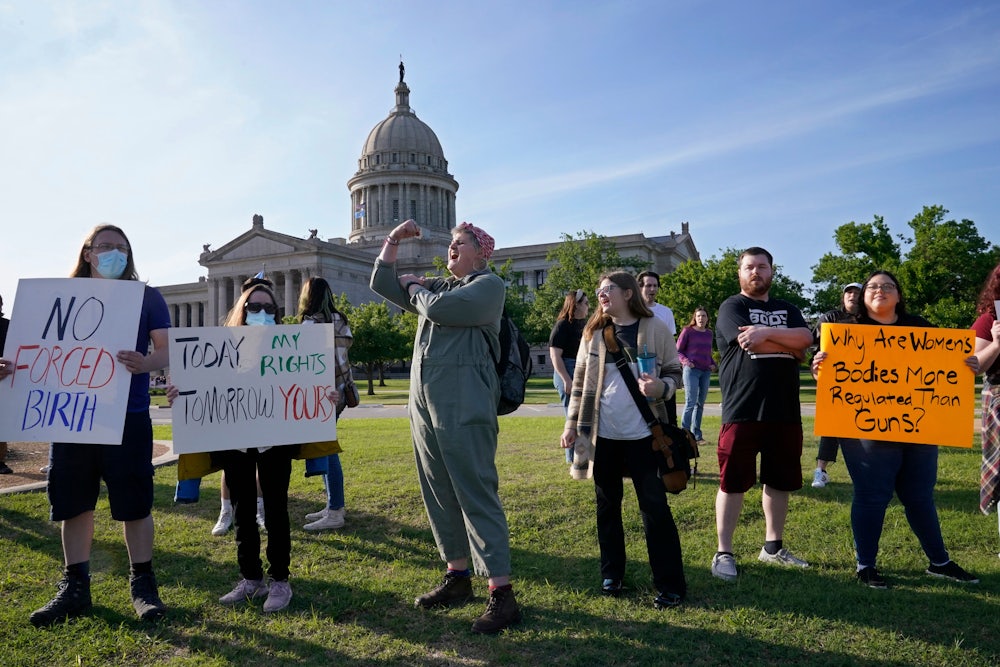Over her nine years of escorting patients to the Tulsa Women’s Clinic—Tulsa’s only independent abortion clinic—Susan Braselton has noticed an alarming increase in the aggression of the protesters outside her clinic. These protesters—who are associated with churches as far away as Muskogee, as well as in Missouri and Kansas—became vitriolic first around Donald Trump’s presidency and then, more recently, at the passage of the nation’s most restrictive abortion ban, in Texas, last September, and on the Supreme Court’s decision to hear Dobbs v. Jackson Women’s Health Organization, the case where Roe v. Wade will likely fall.
A new ban adds fuel to the fire. While most in the nation are still clamoring over the constitutional right to abortion in Roe, an entire state has—overnight—lost access to abortion rights. On Tuesday, Governor Kevin Stitt signed Senate Bill 1503 into law. Due to its emergency clause, the ban goes into effect immediately. S.B. 1503 is modeled after Texas’s S.B. 8, which bans abortions after the detection of a “heartbeat,” usually around six weeks or earlier. Like S.B. 8, Oklahoma’s S.B. 1503 is nearly an outright ban: Six weeks is before most people even know they’re pregnant. And like S.B. 8, S.B. 1503 deputizes private citizens to report anyone who “aids or abets” an abortion, an aspect that, mixed with anti-abortion will, has thus far allowed S.B. 8 to skirt the scrutiny of the courts. Legal challenges have been filed; it is yet to be seen how Oklahoma courts will respond.
The rapid passage of S.B. 1503 into law is true to Stitt’s earlier promise to sign “every piece of pro-life legislation that hits [his] desk.” In April, Stitt also signed S.B. 612, which makes providing an abortion a felony punishable by up to 10 years in prison, into law. Another bill, H.B. 4327, passed the state Senate last Thursday and currently awaits Stitt’s signature. This bill goes further by banning all abortions, even before any “heartbeat.”
It is no wonder, then, that protesters have become more “emboldened” than ever, Braselton told me. They are louder, angrier—even more self-assured. They hurl personal attacks and try to physically overpower clinic escorts. They guilt and intimidate patients, often by trying to call them mothers. They have doxxed Braselton, and regularly invoke the names of her children and her deceased husband in order to deter her from escorting patients from their cars to the clinic doors. Simply put, Braselton said: “They feel like they’ve won the war.”
If there is a “war” to be won with abortion, 2022 has seen it escalate with damning momentum. Last year saw the most restrictions on abortion ever, in the decades that Roe has stood. And on Monday evening, Politico published a leaked draft of the Supreme Court’s majority decision in Dobbs, confirming the fate advocates have long expected: Roe will be no longer.
Valorizing the constitutional right to an abortion feels strange when low-income people and people of color have never been able to access that right equally in Roe’s history. Three years after Roe, the Hyde Amendment made the right to abortion exclusively the right of the affluent, by barring the Medicaid funding of abortions. (The first recognized person to die following an illegal procedure after the Hyde Amendment was a woman named Rosie Jimenez, who funded her first abortion with Medicaid but was unable to fund her second.) There have been other barriers that have proliferated in spite of Roe: Targeted restrictions on abortion providers, or TRAP, laws; waiting periods; counseling; parental notification. Clinics are sparse, and many are shuttering. Your supposed right to an abortion depends on how much money you have and where you live. The work of organizers and advocates like Braselton exist due to the very fact that Roe has never been sufficient.
The demolition of Roe began most clearly at the beginning of the last decade, which saw anti-abortion legislators sweep Congress and state leadership. 2011 brought an unprecedented number of abortion restrictions; only 2021 has trumped that year in severity. Now nearly every Democrat is howling to end the filibuster and pass the Women’s Health Protection Act, which would federally codify the right to abortion and has languished in Congress since 2013. The bill passed the House last year and, as expected, failed in the Senate. Before the WHPA, there was the Freedom of Choice Act, which President Barack Obama described as not his “highest priority” in 2009. And even though President Joe Biden promised that he would finally remove the Hyde Amendment from the annual appropriations bill—where it has been included every single year since its inception in the 1970s—the rider remains. Congress was close to removing it—but not close enough. Democrats are acquiescing.
That the Supreme Court would strike down Roe should come as no surprise. (“We anticipated this decision for several years,” Alexis McGill Johnson, president and CEO of Planned Parenthood, said in a Tuesday press conference.) We should have been this angry when S.B. 8 went into effect last September, forcing thousands of Texans to travel thousands of miles out of state just to receive their rightful health care. We should have been outraged when both the state and federal Supreme Courts allowed these bans to stand, thereby allowing copycat bans in other states—like Oklahoma. What has our “right” to abortion meant here?
To Sam Robertson, another volunteer clinic escort with Braselton, the entire situation reads like this: “If Roe gets overturned, we’re fucked. If Roe doesn’t get overturned, we’re still fucked.”
Robertson has been volunteering with Braselton as a clinic escort for the Tulsa Women’s Clinic through Roe Fund, Oklahoma’s only state abortion fund. Roe Fund not only oversees the volunteer clinic escort program but also provides financial support to anyone who calls. (The only other clinic in Tulsa is the Planned Parenthood clinic, but only the Tulsa Women’s Clinic provides abortions exclusively, and, being independently funded, it needs volunteer assistance.) Robertson doesn’t speak with exasperation. Mostly, she is angry that, in spite of the increasing severity of the situation in Oklahoma, not enough people are paying attention.
The work for Braselton, Robertson, and other clinic escorts has intensified since Texas passed its law. After S.B. 8, Texans began to travel to Oklahoma for their abortions. Braselton estimates that the Tulsa Women’s Clinic began seeing 40 to 60 patients daily. (Speaking to The 19th in February, a spokesperson for Trust Women’s clinics said that their clinics are overwhelmed: Their Oklahoma City clinic now mostly serves Texans, and their Wichita, Kansas, clinic serves Oklahomans unable to book an appointment in their own state as a result.) All this changes with the immediately effective S.B. 1503. Roe Fund is currently planning its next steps.
The most intimidating thought is what happens now. “It’s not going to stop at abortion,” Robertson said, and that’s true: The assault on reproductive rights must be read in conjunction with the assault against trans rights, against critical race theory, against voting rights. All of these issues are intersectional. To Braselton, all this strikes her as “the last grasp for power by old white men,” who are “trying to do everything to cement their power.… They’re wanting an existence that’s never been, a return to an innocence of a nation that’s never been.”
What has been difficult is trying to explain these rapid legal changes to the people Roe Fund serves. The whole system is “confusing,” Robertson said: “How do we expect regular people who are just focused on trying to pay their rent to know?” While S.B. 1503 went into effect immediately, reproductive rights advocates are currently awaiting action from the courts. S.B. 612, signed last month, likely won’t go into effect until the summer, however. The fund’s immediate plan is to begin routing callers to Kansas, whose state Constitution protects abortion.
Another difficulty for these advocates has been building a coalition in a state hostile to reproductive rights. Last Saturday, Robertson and Cassidy Reed, a newer clinic escort through Roe Fund, attended a march for abortion justice, only to be dismayed by the attendance. “Would I say the general public gives a single fuck? No,” Reed said to me.
Reed, who also volunteers with the Center for Public Secrets to advocate for reparations in the Tulsa Race Massacre, knows that activism is not without its occasional disappointments. “For the longest time,” Reed said, she wanted to leave Oklahoma out of frustration with its politics. But after becoming more involved in her community and voicing her opinions, Reed realized: “I needed to stay here to make this a better place for everyone. We need people to stay and fight.”
With S.B. 1503 signed, the protesters outside the Tulsa Women’s Clinic might become more vicious—but if these protesters think they’ve won now, they have no idea what’s ahead. A protester once taunted Braselton, asking what she would do when Roe falls. To that protester, Braselton replied coolly: “I’ll be driving to Kansas.”






